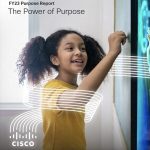By 2030, 500 billion devices and objects will be connected to the Internet. At the same time, as part of our work to positively impact 1 billion people by 2025, Cisco seeks to inspire and empower a generation of global problem solvers. People who will not only thrive but also drive an inclusive digital economy in our increasingly interconnected world.
Digitization—connecting people and things to improve processes and decision-making—is fundamentally changing the way we live, work, and solve problems. Through digitization, organizations can accelerate and magnify their impact through greater efficiency, visibility, and responsiveness.
We understand that solutions to societal and environmental problems around the globe require big ideas, and we firmly believe—and have seen, time and time again—that entrepreneurial students can be an excellent source for these solutions.
This is why we are proud to collaborate with the Rice Alliance and award one of the largest non-dilutive prizes (e.g., funding that does not require the sale of shares of stock) in the Rice Business Plan Competition (RBPC) for the second consecutive year.
At the RBPC in 2016, Cisco selected Neopenda, a social enterprise start-up founded by two young women from Columbia University, for a cash award to help develop a low-cost, low-power, wearable sensor that improves the care of newborns in resource-constrained hospitals. The product continuously monitors newborns’ key vital signs and alerts attending health care professionals when a baby is in distress. Since being recognized by Cisco, Neopenda has received more than half a million dollars in further funding from other investors to make their first field deployment in Uganda a reality.
This year, Cisco awarded its Innovation Challenge Prize at the RBPC to Luso Labs LLC, a team we believe exemplifies a mission-driven mentality. Founded by Columbia University biomedical engineers, Luso Labs’ mission is to leverage digital technologies to make cervical cancer screening more accurate and accessible to women worldwide, especially those in low-resource settings.
The solution utilizes a custom camera system to detect precancerous lesions in a manner that integrates easily into existing clinical practices to minimize obstacles to adoption. Images are captured and sent to a secure server for analysis. The team’s lesion detection algorithm creates a colormap that is layered onto the initial image for easy interpretation by healthcare professionals.
Katherine E. Reuther, Ph.D., Director of MS Studies and Lecturer in Biomedical Engineering at Columbia, advises Luso Labs in bio-design principles. According to Reuther, “Cisco’s awards to early stage solutions like Neopenda and Luso Labs are critical to enabling new ideas – to cross the chasm, prove the concept, and ultimately scale.”
The 100 fastest-growing social enterprises have a five-year average of 350 percent growth while new and young companies have been the largest net job creators in the U.S. since the 1970s. Just as businesses need to invest in developing new products and services to open new markets, it is imperative in our increasingly digital economy that we uncover innovation and provide early stage investment to this new generation of students and entrepreneurs pioneering “digital native” solutions. With technology at the core of their work, these innovators can accelerate how we solve pressing problems in our communities and around the world, enabling us to achieve new levels of “possible.”
Inspired by our work with the RBPC, we’re expanding our awards to social enterprises through wider global challenges. How can your new technology solution or service help benefit the economy, society, or environment?
Tell us by applying to our Cisco Global Problem Solver Challenge with $300,000 in prizes for students and recent grads. We all have a role to play to change the world. We look forward to hearing your ideas.


Proud to have Cisco, a proven leader in entrepreneurship and social responsibility, as a partner in the Rice Business Plan Competition. Their mentorship and support of Neopenda, Luso Labs and so many other RBPC teams confirms Cisco’s strong commitment to improving the lives of people around the world.
Its really nice to know and as well to hear this ongoing innovation.. Am very much interested on it….please permit me to say; I think have more ideas on this innovation as an Agricultural and Bio. Environmental Engineering Student.